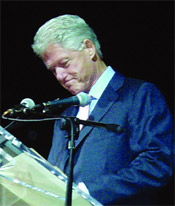Solve petty differences, then focus on global issues
“The future is too full of challenges which can only be met here in our neighbourhood, and around the world, if we work together,” Clinton said as the keynote speaker at the Canadian-American Relations Conference held at the John Labatt Centre last week.
 Clinton, who served as President from 1992 until 2000, spoke for almost an hour to an intimate middle-aged crowd of approximately 3,700. After the keynote address, the diplomat answered questions from host Susan Ormiston of CBC's The National.
Clinton, who served as President from 1992 until 2000, spoke for almost an hour to an intimate middle-aged crowd of approximately 3,700. After the keynote address, the diplomat answered questions from host Susan Ormiston of CBC's The National.
Tickets for the event were a mere $86 to $100, which is miniscule compared to the $1,200 price tag for the Clinton soir�e this week in Toronto.
Clinton used his political clout to raise awareness of important global issues, which can sometimes be overshadowed on the world stage by the big business and governmental concerns of North Americans.
“Over a billion people almost have no access to running water, so while we herald the virtues of freetrade and globalization, they wonder what we are talking about.”
Clinton said the only way poor countries can experience the value of independence is if powerful countries like Canada and the US create a climate so companies can invest.
“You have to make the world about partners and fewer terrorists. With more friends and fewer enemies. And we have to do this by helping grow economies.”
He was also very accommodating to his Canadian hosts, which would usually pay Clinton an average of $160,000 US to speak at such an event.
Climate control and global warming were also on the list of topics the former president spoke about, saying he doesn't agree with the current American administration's lack of commitment to the Kyoto Accord or their environmental position.
“In the end, if we keep pouring as much oil and coal into the air as we are now� the climate is going to warm at an unsustainable pace,” Clinton warned. “We already know, all the latest surveys tell us, that the number of severe weather events in the world is increasing � because the climate is changing at an unsustainable rate.”
He went on to praise technological advancements like solar power, wind turbines and bio-fuel, which he feels are the future of energy.
He also briefly talked about his differing opinion with President Bush on issues concerning Iraq.
“On Iraq, I thought it was wrong to invade before UN inspectors did their job,” Clinton said. He added that he got along with Bush in spite of their different views.
One topic of contention Clinton touched on was the softwood lumber dispute, which Canadian and American politicians are currently butting heads over. Clinton said that although he wasn't an expert on the topic, Paul Martin was right to stand up against the United States and advised Martin to “be tough on us.”
At one point a desperate sounding audience member shouted out, “Why don't you run for Prime Minister?” which was followed by a moment of awkward laughter while the crowd refocused their attention on Clinton.
Nearing the end of the question and answer period, Ormiston finally asked the question that was on everyone's mind. Will Bill Clinton run for President again? In typical political fashion, Clinton talked around the question said he didn't know, but he did profess his support to his wife, New York Senator Hillary Clinton.
“Whatever she wants to do, I support her. I'm on her team.”
When Clinton left the stage, along with the strategically placed secret service agents who scattered the JLC, he was replaced by Pamela Wallin, Canada's Consul General to New York City, and Peter MacKay, Deputy Leader of the Conservative Party. The two sat down with Ormiston and discussed cross-border security issues and Canada/US relations.
Both speakers emphasized that Canada will always have a strong relationship with the United States, not only geographically, but also in terms of economics and trade.
According to Wallin, Canada does more trade with the head office of Home Depot in Atlanta than it does with the entire country of France.













